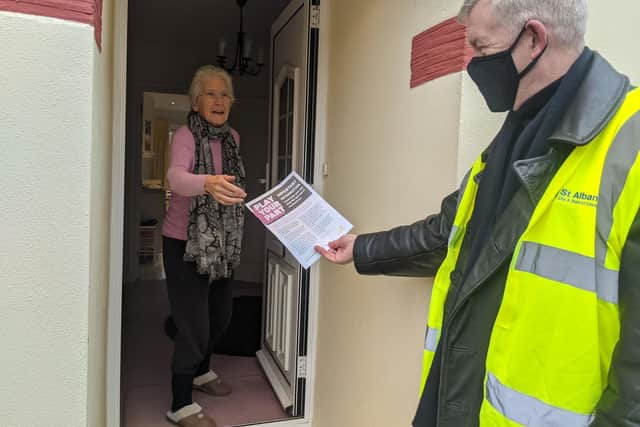Home visits to help Hertfordshire's self-isolators
and live on Freeview channel 276
A new support team starts knocking on doors across Hertfordshire this week, offering advice and support to people who are required by law to self-isolate for 10-14 days to help contain the spread of coronavirus.
Public health professionals will be visiting people across the county who national and local contact tracing teams have been unable to reach by telephone.
Advertisement
Hide AdAdvertisement
Hide AdThe aim is to ensure that people self-isolating – which means staying at home and not going out unless it’s an emergency – understand the rules, and can get the help they need.


Those who cannot be contacted the first time will be left a letter which clearly explains the purpose of the visit and reminds people that it is against the law to leave the home under self-isolation.
Those who still cannot be contacted a second time risk being referred to the police for further action to be taken.
This is the latest in a series of measures introduced in Hertfordshire to help people understand when and how to self-isolate, how long for, and why it’s important.
Advertisement
Hide AdAdvertisement
Hide AdIt is part of a wider ‘Self Isolate Means Stay At Home’ campaign of activity that includes:
- Hard-hitting reminders on social media that self-isolate means staying at home, and pointing them to HertsHelp
- Clear guidance and contact details for those who can help being handed out at testing centres throughout the county
- The launch this week of the online #HertsIsolationChallenge which gives guidance and encouragement on maintaining physical and mental wellbeing when isolating
Advertisement
Hide AdAdvertisement
Hide AdCllr Tim Hutchings, the county council’s public health and prevention lead, said: “Self-isolate means staying at home for 10-14 days, and for many people that can be tough.
"It is, however, extremely important to follow the rules otherwise you are putting others at risk of serious illness or worse.
"It’s one of the key tools we have to help contain the spread of the virus, saving lives and livelihoods and preventing us all from going into Tier 3 which would mean even tougher restrictions for everyone.”
Cllr Linda Haysey, who heads the community reassurance work of the Local Resilience Forum, added: “If you’re in self-isolation now, please stick to the rules.
Advertisement
Hide AdAdvertisement
Hide Ad"You may not even have symptoms but you could still be a risk to others. Ask for help if you need it and make sure you look after yourself and your family.
"Maintaining your physical and mental wellbeing during a period of self-isolation is really important too, and if you use social media look out for the Herts Isolation Challenge we’re also launching this week which aims to encourage you to do that.”
For advice on self-isolation, click here.
You should self-isolate if any of the following apply:
- you have any symptoms of coronavirus (a high temperature, a new, continuous cough or a loss or change to your sense of smell or taste)
- you've tested positive for coronavirus – this means you have coronavirus
- you live with someone who has symptoms or tested positive
Advertisement
Hide AdAdvertisement
Hide Ad- someone in your support bubble has symptoms or tested positive
- you're told to self-isolate by NHS Test and Trace or the NHS COVID-19 app
- you arrive in the UK from a country with a high coronavirus risk – see www.gov.uk on how to self-isolate when you travel to the UK.
Self-isolation means that you cannot leave your home because you have or might have coronavirus (COVID-19). This means you cannot:
Advertisement
Hide AdAdvertisement
Hide Ad- visit family or friends or have visitors to your home (except for people providing essential care)
- go to any shops or supermarkets – order food and medicine online or contact HertsHelp
- go out to exercise or walk your dog – exercise at home or in your garden
- go to work, university, college or school - work from home if you can
- use public transport, taxis or share a car
- attend parties or other events, even if these are outside.
If you are in need of support with food and other essentials, visit www.hertshelp.net, call 0300 123 4044 or email [email protected].